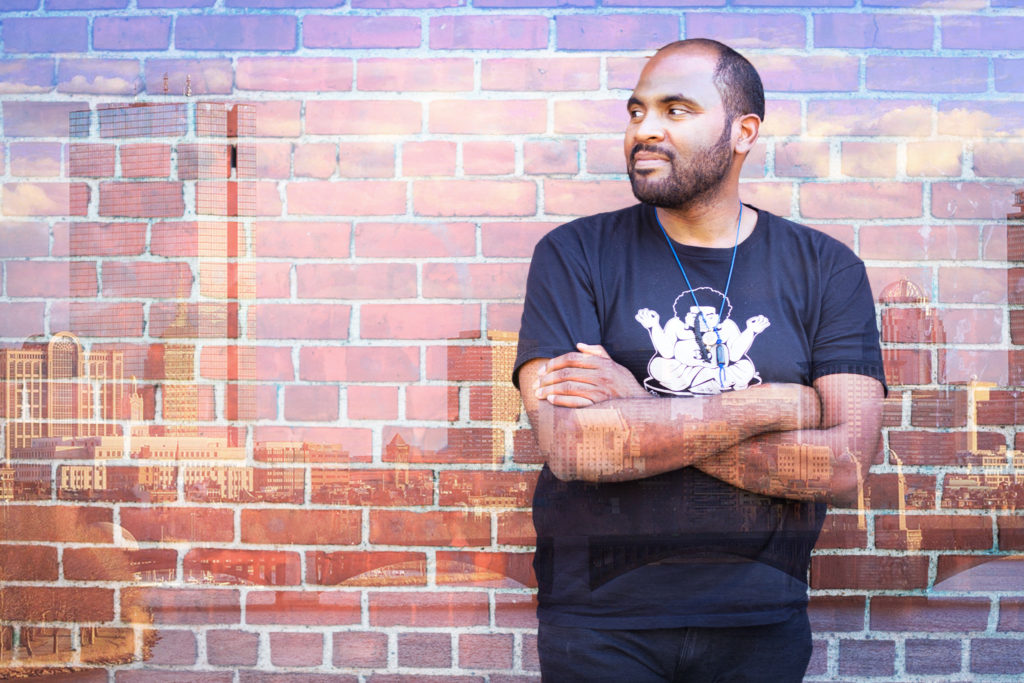Steps We Can All Take to Eliminate Racial Inequity
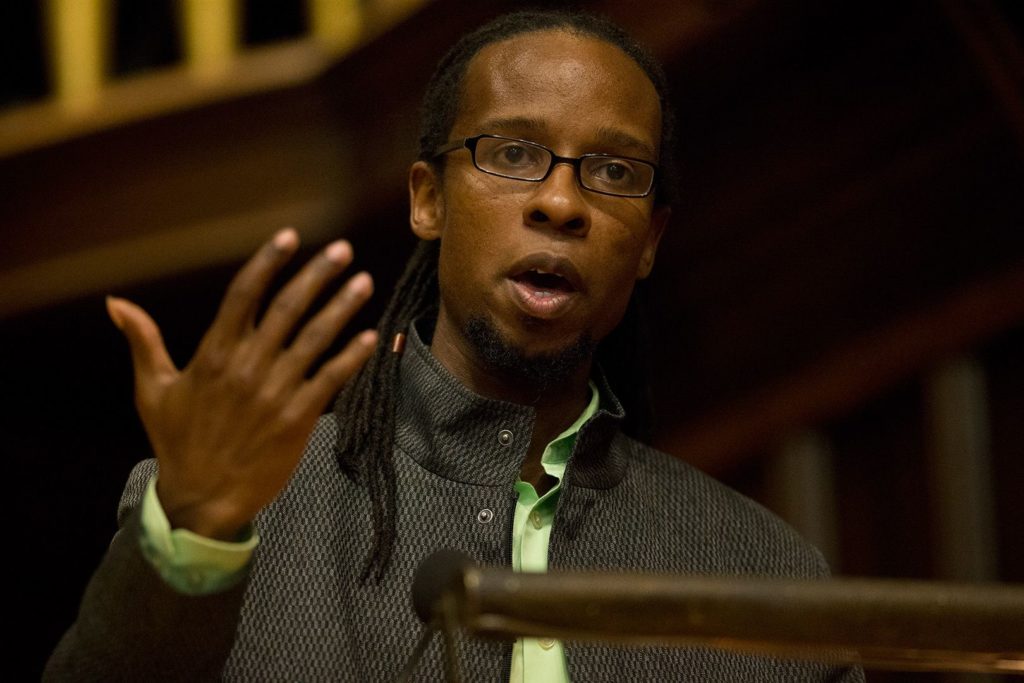
I’m meeting today with one of the White Awake discussion groups I’ve been leading and we’ll be talking about How to be an Antiracist, by Ibram X. Kendi (which I highly recommend — along with his previous book Stamped from the Beginning: the Definitive History of Racist Ideas in America.)
Of his research into the history of racism Kendi writes, “Over time, the source of racist ideas became obvious, but I had trouble acknowledging it. The source did not fit my conception of racism, my racial ideology, my racial identity. I became a college professor to educate away racist ideas, seeing ignorance as the source of racist ideas, seeing racist ideas as the source of racist policies, seeing mental change as the principal solution, seeing myself, an educator, as the primary solver…
“My research kept pointing me to the same answer: The source of racist ideas was not ignorance and hate, but self-interest.
“The history of racist ideas is the history of powerful policymakers erecting racist policies out of self-interest, then producing racist ideas to defend and rationalize the inequitable effects of their policies, while everyday people consume those racist ideas, which in turn sparks ignorance and hate…
“Racist policies,” Kendi writes, “lead to racist ideas, not the other way around, as we have commonly thought. We must eliminate racist policies if we ever hope to eliminate racist ideas.”
To that end, Kendi has founded the Antiracist Research and Policy Center in Washington, D.C., where he envisions bringing together teams of scholars, policy experts, journalists, and advocates to focus on the most critical and seemingly intractable racial inequities.
He writes, “These teams would model some of the steps we can all take to eliminate racial inequity in our spaces:
- Admit racial inequity is a problem of bad policy, not bad people.
- Identify racial inequity in all its intersections and manifestations.
- Investigate and uncover the racist policies causing racial inequity.
- Invent or find antiracist policy that can eliminate racial inequity.
- Figure out who or what groups has the power to institute antiracist policy.
- Disseminate and educate about the uncovered racist policy and antiracist policy correctives.
- Work with sympathetic antiracist policymakers to institute the antiracist policy.
- Deploy antiracist power to compel or drive from power the unsympathetic racist policymakers in order to institute the antiracist policy.
- Monitor closely to ensure the antiracist policy reduces and eliminates racial inequity.
- When policies fail, do not blame the people. Start over and seek out new and more effective antiracist treatments until they work.
- Monitor closely to prevent new racist policies from being instituted.
Consoling but Costly

The next book my CDL White Awake group will be discussing is How to Hide an Empire: A History of the Greater United States, by Daniel Immerwahr.
I’ve just started reading it and I can already see how little I know about the whole of my country!
Here’s an excerpt from the introduction:
“This country perceives itself to be a republic, not an empire. It was born in an anti-imperialist revolt and has fought empires ever since, from Hitler’s Thousand Year Reich and the Japanese Empire to the ‘evil empire’ of the Soviet Union. It even fights empires in its dreams. Star Wars, the saga that started with a rebellion against the Galactic Empire, is one of the highest-grossing film franchises of all time.
“This self-image of the United States as a republic is consoling, but it’s also costly. Most of the cost has been paid by those living in the colonies, in the occupation zones, and around the military bases. The ‘logo map’ has relegated them to the shadows, which are a dangerous place to live. At various times, inhabitants of the U.S. Empire have been shot, shelled, starved, interned, dispossessed, tortured, and experimented on. What they haven’t been, by and large, is seen.
“The ‘logo map’ carries a cost for mainlanders, too. It gives them a truncated view of their own history, one that excludes part of their country. It is an important part. As I seek to reveal, a lot has happened in the territories, occurrences highly relevant to mainlanders.
“The overseas parts of the United States have triggered wars, brought forth inventions, raised up presidents, and helped define what it means to be ‘American.’ Only by including them in the picture do we see a full portrait of the country — not as it appears in its fantasies, but as it actually is.”
The Beginning of Something

I have just started reading Lost Children Archive, by Valeria Luiselli, for my White Awake book discussion group and I am completely blown away. It’s nothing like anything I’ve ever read before, and yet it’s not difficult or weird or in-your-face innovative. It’s just fascinating. And surprising. And beautiful.
Here’s an excerpt (which doesn’t even begin to do it justice):
“I’m not sure what deeper reasons prompted us to record the children that night. Maybe it was just the summer heat, plus the wine, minus the joint, times the excitement of the move, divided by all the cardboard recycling ahead of us. Or maybe we were following an impulse to allow the moment, which felt like the beginning of something, to leave a trace.
“After all, we’d trained our minds to seize recording opportunities, trained our ears to listen to our daily lives as if they were raw tape. All of it, us and them, here and there, inside and outside, was registered, collected, and archived.
“New families, like young nations after violent wars of independence or social revolutions, perhaps need to anchor their beginnings in a symbolic moment and nail that instant in time. That night was our foundation, it was the night where our chaos became a cosmos.”
More to Wake Up to
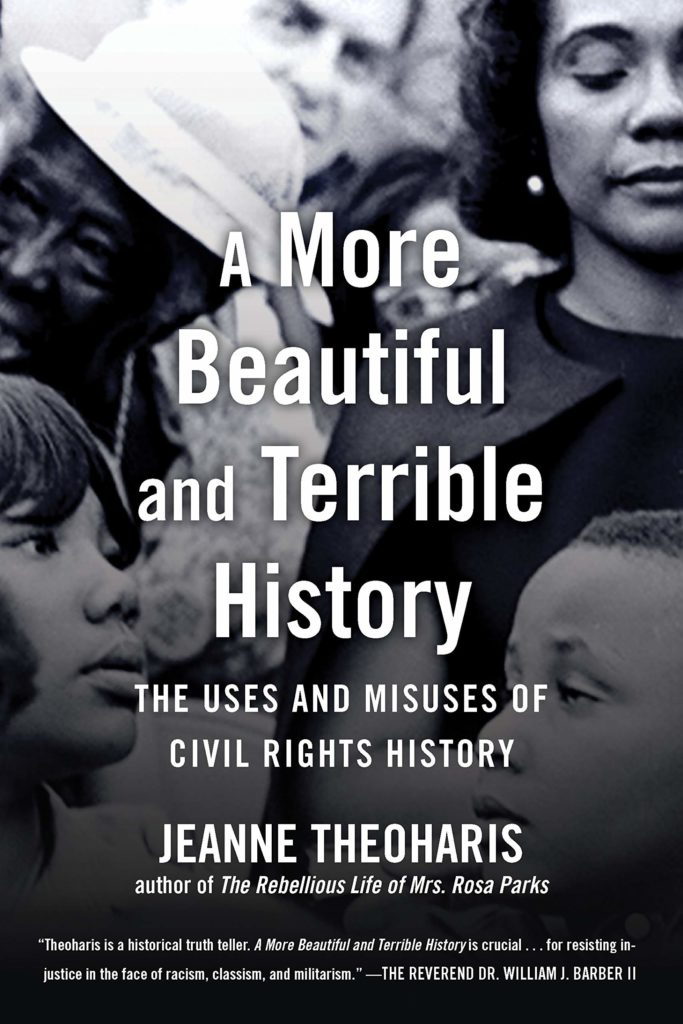 After reading Jeanne Theoharis’ sobering op-ed in the New York Times, What King Said About Northern Liberalism, my CDL Waking Up to Whiteness group has selected for our next discussion Theoharis’ A More Beautiful and Terrible History: The Uses and Misuses of Civil Rights History.
After reading Jeanne Theoharis’ sobering op-ed in the New York Times, What King Said About Northern Liberalism, my CDL Waking Up to Whiteness group has selected for our next discussion Theoharis’ A More Beautiful and Terrible History: The Uses and Misuses of Civil Rights History.
From the publisher: “The civil rights movement has become national legend, lauded by presidents from Reagan to Obama to Trump, as proof of the power of American democracy.
“This fable, featuring dreamy heroes and accidental heroines, has shuttered the movement firmly in the past, whitewashed the forces that stood in its way, and diminished its scope. And it is used perniciously in our own times to chastise present-day movements and obscure contemporary injustice.
“In A More Beautiful and Terrible History award-winning historian Jeanne Theoharis dissects this national myth-making, teasing apart the accepted stories to show them in a strikingly different light.”
***
I expect this will not be an easy read, but I feel ready for it. How about you?
My New Favorite Christmas Movie!
Yesterday the members of one of the Waking Up to Whiteness anti-racism groups I’ve working with went together to see Green Book, which I had thought would be difficult-to-watch-but-“good-for-me” — but which turned out to be NOT-difficult-to-watch (yet also not sugar-coated) and not just a “good experience” for me, but a WONDERFUL MOVIE for just about everyone!
Here’s the synopsis, which is based on a TRUE story: “Dr. Don Shirley is a world-class African-American pianist who’s about to embark on a concert tour in the Deep South in 1962. In need of a driver and protection, Shirley recruits Tony Lip, a tough-talking bouncer from an Italian-American neighborhood in the Bronx. Despite their differences, the two men soon develop an unexpected bond while confronting racism and danger in an era of segregation.”
AND it’s got a Christmas-Eve ending!
GO SEE IT.
(Click here for the official trailer.)
Perhaps to Bloom
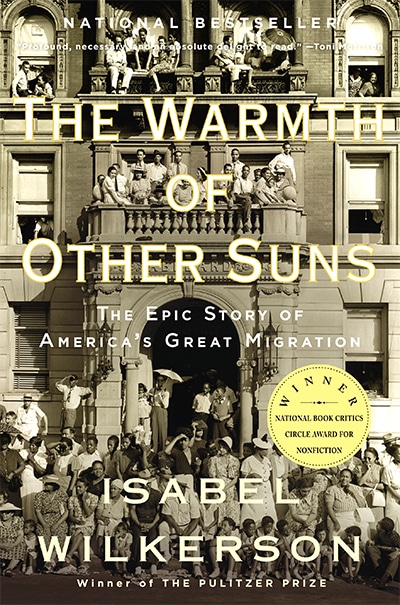 The next book my CDL “White Awake” discussion group will be reading is The Warmth of Other Suns: The Epic Story of America’s Great Migration, by Isabel Wilkerson.
The next book my CDL “White Awake” discussion group will be reading is The Warmth of Other Suns: The Epic Story of America’s Great Migration, by Isabel Wilkerson.
It got rave reviews when it came out in 2010, and it won tons of awards, including the National Book Critics’ Circle Award for Nonfiction and the Pulitzer Prize.
But I didn’t read it back then. I remember hearing it mentioned in favorable terms, but I really wasn’t paying attention. Probably because I didn’t think it had anything to do with me.
But that was then.
I’m a little more awake now.
***
Epigraph:
(taken from an early edition of Black Boy, by Richard Wright)
I was leaving the South
To fling myself into the unknown….
I was taking a part of the South
To transplant in alien soil,
To see if it could grow differently,
If it could drink of new and cool rains,
Bend in strange winds,
Respond to the warmth of other suns
And, perhaps, to bloom.
***
Contemplating Externally
I’ve just signed up to attend a very unusual weekend course offered at the Barre Center for Buddhist Studies (BCBS). The title of the course is Satipattana in Dialogue with Suffering and Oppression and it’s being taught by my mentor, Lila Kate Wheeler, and Lama Rod Owens (pictured above), co-author of Radical Dharma (which I’ve posted about here and here).
This is the course description:
Satipatthana means “foundations of mindfulness.” As the Buddha originally taught this, mindfulness and clear comprehension are offered as the most helpful, liberating way to relate to four areas of experience: body, feeling tones, mind, and Dharmas or psychophysical patterns. Contemporary mindfulness, as widely practiced in many different engagements, tends to emphasize the internal or personal aspects of satipatthana.
Yet the Buddha’s instructions ask that we practice ‘externally’ too. During this course we will present a traditional understanding of satipatthana, and place it in dialogue with challenges many of us face in our daily lives. Can satipatthana be a helpful, liberating way to relate to racism, class, ableism, patriarchy, sex, environmental violence, and body shame? How do we move toward freedom?
***
Doesn’t sound like your typical “Four Foundations of Mindfulness” retreat, now does it!
Interested?
Think about taking the course with me!
BCBS is located in Barre, MA, near Boston. There are direct flights on Southwest from St. Louis to Boston, where you can get a shuttle that will take you to BCBS, which is out in the woods and is an AWESOME place to practice — even in December! The cost of the course with room and board is $327 (plus a donation to the teachers). Scholarships are available.
The course dates are: Thursday, Dec 6 (early evening) to Sunday, Dec 9 (mid-day).
Check it out!!!!
There Will Come a Time
 This is what I have learned from working with my dharma friends on Waking Up to Whiteness: It’s necessary to recognize the reality of racism; it’s important to want racism to end.
This is what I have learned from working with my dharma friends on Waking Up to Whiteness: It’s necessary to recognize the reality of racism; it’s important to want racism to end.
But it won’t end until: “I’m not a racist,” turns into: “I’m antiracist. Antiracism is one of my core values. My actions in the world are based on that.”
In support of which, I offer this except from Stamped from the Beginning: The Definitive History of Racist Ideas in America, by Ibram X. Kendi:
“An antiracist America can only be guaranteed if principled antiracists are in power, and then antiracist policies become the law of the land, and then antiracist ideas become the common sense of the people, and then the antiracist common sense of the people holds those antiracist leaders and policies accountable.
“And that day is sure to come. No power lasts forever. There will come a time when Americans will realize that the only thing wrong with Black people is that they think something is wrong with Black people.
“There will come a time when racist ideas will no longer obstruct us from seeing the complete and utter abnormality of racial disparities. There will come a time when we will love humanity, when we will gain the courage to fight for an equitable society for our beloved humanity, knowing, intelligently, that when we fight for humanity, we are fighting for ourselves.
“There will come a time. Maybe, just maybe, that time is now.”
***
I am committed to that.
Preceded by Mind
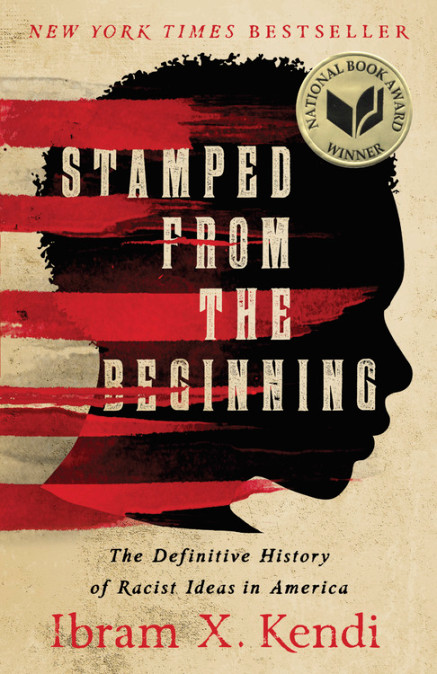 I’ve started reading the book my CDL White Awake buddies will be discussing next month — Stamped from the Beginning: The Definitive History of Racist Ideas in America, by Ibram X. Kendi — and I just want to say, in case anyone is confused about why I keep posting stuff about racism on this site: This is Dharma.
I’ve started reading the book my CDL White Awake buddies will be discussing next month — Stamped from the Beginning: The Definitive History of Racist Ideas in America, by Ibram X. Kendi — and I just want to say, in case anyone is confused about why I keep posting stuff about racism on this site: This is Dharma.
What do I mean?
Here is Gil Fronsdal’s translation of the first line of the Dhammapada:
“All experience is preceded by mind, led by mind, made by mind.”
And here’s an excerpt from the preface of Stamped from the Beginning:
“Racist ideas have done their job on us. We have a hard time recognizing that racial discrimination is the sole cause of racial disparities in this country and in the world at large.
“I write we for a reason. When I began this book, with a heavy heart for Trayvon Martin and Rekia Boyd, I must confess that I held quite a few racist ideas. Even though I am an Africana studies historian and have tutored all my life in egalitarian space, I held racist notions of Black inferiority before researching and writing this book.
“Racist ideas are ideas. Anyone can produce them or consume them, as Stamped from the Beginning‘s interracial cast of producers and consumers show. Anyone–Whites, Latina/os, Blacks, Asians, Native Americans–anyone can express the idea that Black people are inferior, that something is wrong with Black people. Anyone can believe both racist and antiracist ideas, that certain things are wrong with Black people and other things are equal.
“Fooled by racist ideas, I did not fully realize that the only thing wrong with Black people is that we think something is wrong with Black people. I did not fully realize that the only thing extraordinary about White people is that they think something is extraordinary about White people.
“I am not saying all individuals who happen to identify as Black (or White or Latina/o or Asian or Native American) are equal in all ways. I am saying that there is nothing wrong with Black people as a group, or with any racial group. That is what it truly means to think as an antiracist: to think there is nothing wrong with Black people, to think that racial groups are equal.”
***
Read the book. And think about it.
At the Threshold
 From In the Shadow of Statues: A White Southerner Confronts History, by Mitch Landrieu, which my CDL “White Awake” group will be discussing next month:
From In the Shadow of Statues: A White Southerner Confronts History, by Mitch Landrieu, which my CDL “White Awake” group will be discussing next month:
“Unlike the cursing anonymous voice on a telephone, or the menacing face, or the billy club that split John Lewis’s head in Selma, Alabama at the Edmund Pettus Bridge in 1965, implicit bias is hard to see; implicit bias is a silent snake that slinks around in ways we don’t notice.
“Questions gather at the threshold of transformative awareness. Whom do we sit with at lunch? Who are the kids we invite to our children’s parties? Or look at for honors programs at school? Who do we think of as smart, with good moral fiber, God-loving and patriotic? To whom do we give the benefit of the doubt, and why? Who are the people we condemn most quickly?
“As questions multiply about the consequences of race, it forces you to look in the mirror and see yourself as you really are, not who you’ve been told you are, not who society has made you to be, and not the image you want others to perceive.
“That’s when you start noticing things about yourself you never thought about before. The sight is not always pretty.”


